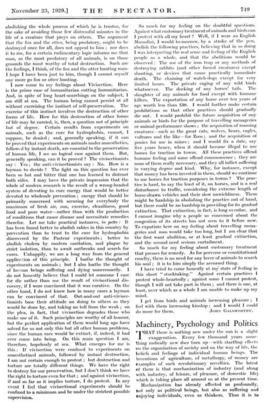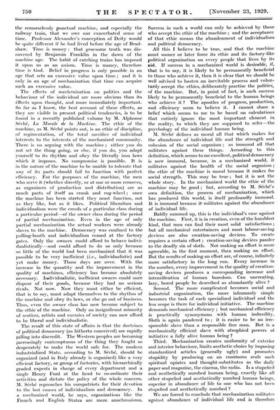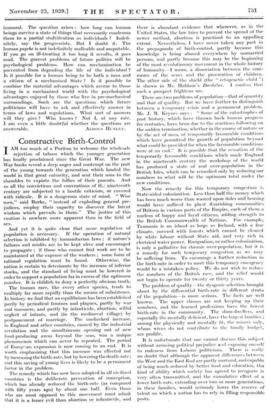Machinery, Psychology and Politics
THAT there is nothing new under the sun is a slight exaggeration. Every few thousand years some- thing radically new does turn up—with startling effects on the organization of society and on the way of life, the beliefs and feelings of individual human beings. The inventions of agriculture, of metallurgy, of money are examples of such revolutionary novelties. The latest of them is that mechanization of industry (and along with industry, of leisure, of pleasure, of domestic life) which is taking place all around us at the present time.
Mechanisation has already affected us profoundly, not only as political beings, but also as suffering and enjoying individuals, even as thinkers. Thus it is to the remorselessly punctual machine, and. especially the railway train, that we owe our exacerbated sense of time. Professor Alexander's conception of Deity would be quite different if he had lived before the age of Brad- shaw. Time is money : that gruesome truth was dis- covered by Benjamin Franklin in the dawn of the machine age. The habit of catching trains has imposed it upon us as an axiom. Time is money, therefore time is God. Belief -in progress is only possible in an age that sets an excessive value upon time ; and it is only in an age of mechanization that time can acquire such an excessive value.
The effects of mechanization on politics and the behaviour of the individual are more obvious than its effects upon thought, and more immediately important. So far as I know, the best account of these effects, as they arc visible in present political tendencies, is to be found in a recently published volume by M. Alphonse Seche, La Morale de la Machine. The ethic of the machine, as M. Seche 'points out, is an ethic of discipline, of regimentation, of the total sacrifice of individual interests to the interests of the mechanized community. There is no arguing with the machine ; either you do not set the thing_ going, or else, if you do, you adapt yourself to its rhythm and obey the literally iron laws which it imposes. No compromise is possible. It is in the nature of the machine to be unable to tolerate that any of its parts should fail to function with perfect: efficiency. For the purposes of the machine, the men who serve it (whether directly, or at one or more removes, as organizers of production and distribution) are as much parts of itself as crank and cog-wheel ; once the machine has been started they must function, not as they like, but as it likes. Political liberalism 'and individualism were the creeds of a particular class during a particular period—of the owner class during the period of partial mechanization. Even in the age of only partial mechanization the actual workers were already slaves to the machine. Democracy was confined to the polling-booth and individualism ceased at the factory gates. Only the owners could afford to behave indivi- dualistically—and could afford to do so only because so little of the world had been mechanized that it was possible to be very inefficient (i.e., individualistic) and yet make money. Those days are over. With the increase in the quantity and the improvement in the quality of machines, efficiency has become absolutely necessary. Individualistic, inefficient owners could once dispose of their goods, because they had no serious rivals. Not now. Now they must either be efficient, that is to say, must-adapt themselves to the rhythm of the machine and obey its laws, or else go out of business: Thus, even the owner class has now become subject to the ethic of the machine. Only an insignificant minority of renders, artists and enemies of society can now afford to be liberal and individualistic.
The result of this state of affairs is that the doctrines of political democracy (as hitherto conceived) are rapidly falling into discredit. The Western peoples are becoming increasingly contemptuous of the thing they fought so desperately to make the world safe for. The modern industrialized State, according to M. Seche, should be organized (and in Italy already is organized) like a very efficient factory, or group of factories, with hierarchically graded experts in charge of every department and a single Henry Ford at the head to co-ordinate their activities and dictate the policy of the whole concern: M. Seale reproaches his compatriots for their devotion to the lost causes of individualism and democracy. In a mechanized world, he says, organizations like the French and English States are mere anachronisms-, Success in such a world can only be achieved by those who accept the ethic of the machine ; and the acceptance of that ethic means the abandonment of individualism and political democracy.
All this I believe to be true, and that the machine must sooner or later force its ethic and its factory-like political organization on every people that lives by its aid. If success in a_ mechanized world is desirable, if, that is to say, -it is likely to be permanently beneficial to those who achieve it, then it is clear that we should be well advised to hasten an inevitable process and volun- tarily accept the ethics, deliberately practise the politics, of the machine. But, in point of fact, is such success likely to be permanently beneficial to the human beings who achieve it ? The apostles of progress, production, and efficiency seem to believe it. I cannot share a belief which seems to me to be based on calculations that entirely ignore the most important element in the reality, to which they are supposed to refer—the psychology of the individual human being.
M. Seche defines as moral all that which makes for the abundance of individual life and the strength and cohesion of the social organism ; as immoral all that militates against these things. According to this definition, which seems to me excellent, political democracy is now immoral, because, in a mechanized world, it militates against the health of the social organism ; the ethic of the machine is moral because it makes for social strength. This may be true ; but it is not the whole story. In the mechanized world the ethic of the machine may be good ; but, according to M. Seehes own definition, the process of mechanization, which has produced this world, is itself profoundly immoral. It is immoral because it militates against the abundance of individual life.
Baldly summed up, this is the individual's case against the machine. First, it is in creation, even of the humblest kind, that men can find their most solid satisfactions ; but all mechanical entertainers and most labour-saving .devices are also creation-saving devices. To create requires a certain effort ; creation-saving devices pander to the deadly sin of sloth. Not making an effort is more agreeable, in the first moment, than making an effort. But the results of making an effort are, of course, infinitely more satisfactory in the long run. Every increase in the number, every improvement -in the quality of creation- saving devices produces a corresponding increase and intensification of human boredom. Can uncreating, lazy, bored people be described as abundantly alive ?
Second. The more complicated becomes social and industrial organization, the more inhumanly simple becomes the task of each specialized individual and the less scope is there for individual initiative. The machine demands mechanical efficiency ; but mechanical efficiency is practically synonymous with human imbecility. Sloth is again pandered to ; it is easier to be an irre- sponsible slave than a responsible free man. But is a mechanically efficient slave with atrophied powers of initiative a fully alive human being ?
Third. Mechanization creates uniformity of exterior and interior behaviour, limits aesthetic choice by imposing standardized articles (generally ugly) and promotes stupidity by producing on an enormous scale such spiritual opiates and thought-substitutes as the daily paper and magazine, the cinema, the radio. Is a stupefied and aesthetically numbed human being, exactly like all other stupefied and aesthetically numbed human beings, superior in abundance of life to one who has not been stupefied and aesthetically numbed ?
We are forced to conclude that mechanization militates against abundance of individual life and is therefore immoral. The question arises : how long can human beings survive a state of things that necessarily condemns them to a partial stultification as individuals ? Indefi- nitely, say the progressists. But I doubt it. The human psyche is not indefinitely malleable and =mutable. If you go on ill-treating it too long it revolts, it goes mad. The gravest problems of future politics will be psychological problems. How can mechanization be prevented from degrading the life of the individual ? Is it possible for a human being to be both a man and a citizen of .a mechanized State ? Is it possible to combine the material advantages which accrue to those living -in a' mechanized world with the psychological advantages enjoyed by those who live in pre-mechanical surroundings. Such are the questions which future politicians will have . to ask and effectively answer in terms of laws and regulations. What sort of answers will they give-? Who knows ? Not I, at any rate. I am even a little doubtful whether the questions are
































































 Previous page
Previous page